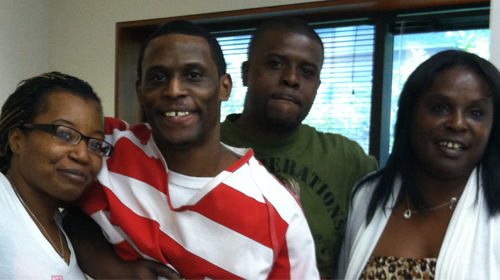
For the last five years, I have been representing an innocent man.
I first met Montez Spradley on Alabama's death row in 2008. From that very first day, he vigorously maintained his innocence of the crime that landed him there: the 2004 murder of a 58-year old grandmother in Birmingham.
Last Friday, Montez . It has been a long journey from a trial described as a "miscarriage of justice" to death row to a retrial to last week's plea, but finally, in a matter of years, Montez will be able to leave the horror of the last several years behind him.
How does an innocent man end up on death row? The answer lies with a death penalty system broken beyond repair.
Flawed Trial, Wrongful Conviction
Five years ago, Montez was sentenced to death for a crime he did not commit. The state's evidence against him was thin. Despite this flawed trial, 10 of the 12 jurors recommended a sentence of life imprisonment. The judge overruled the jury's votes to let Montez live and sent him to death row. Unluckily for Montez and others on trial for their life in Alabama, the state is one of only a handful of states to allow judicial override, and the only state in which it is routinely used.
An Unjust Death Sentence Thrown Out
We submitted his appeal to the Alabama Court of Criminal Appeals and anxiously awaited a decision. Our hopes were tempered by the reality that too many innocent people have been sentenced to death and too few people get a chance at justice in Alabama. We also knew that the odds were against this young Black man, convicted of the murder of a white woman, as race continues to play a grossly disproportionate role in our country's death penalty system. But in late 2011, the Court of Criminal Appeals gave Montez a new chance for justice. The unanimous court reversed the case for four separate reasons, finding that Montez's first trial was a "miscarriage of justice." Montez was headed back to Birmingham for a new trial.
A New Trial Exposes Even More Flaws in the Prosecution
A new trial was great news, as Montez was no longer on death row, but he was still at risk – once again – of being sentenced to death for a crime he did not commit.
We always knew the evidence connecting Montez to the murder was weak, but we soon learned that it was even weaker than we thought. At his first trial, two witnesses had claimed that he confessed to them: his jaded ex-girlfriend and a jailhouse snitch. We already knew that both had serious credibility problems, but then we discovered that Montez's ex-girlfriend had been paid more than $10,000 in reward money after she testified against Montez – a fact the prosecution never revealed to Montez's defense team. Then, earlier this year, his ex-girlfriend recanted and admitted that Montez had never confessed to her.
Based on this flimsy evidence, the prosecution should never have sought a conviction, let alone a death sentence, against Montez. Rather than expend resources to identify the real killer (who we believe was later killed in an unrelated incident), the prosecution doggedly sought the death penalty against Montez a second time. Until last week's deal.
Finally, An Innocent Man Will Go Free
Rather than face a new trial and risk returning to death row, last week Montez entered what's called an Alford plea. In an Alford plea, a defendant maintains his innocence of the crime but agrees that a deal is in his best interest. It's an incredibly difficult decision for an innocent man to accept a sentence for a crime he did not commit, but we need not look any farther than the to know that a capital trial does not guarantee an acquittal, even when you're innocent. The risk of another death sentence was simply too great.
Montez is not free today, but he will be free soon. He will serve the rest of his time without the threat of execution hanging over his head. One day he will get to hug his mother and his children outside of prison walls. And most importantly, he will not die at the hands of the State for a crime he did not commit.
For many, death row is a double punishment – years spent locked in solitary confinement before ever seeing the execution gurney. For more, read the ACLU's new report A Death Before Dying.
Learn more about death row and other civil liberties issues: Sign up for breaking news alerts, , and .


